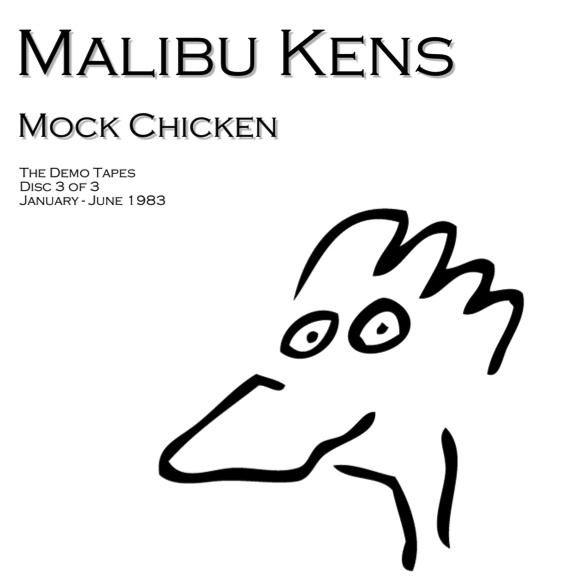
Cover art by Scott Juskiw (from a notebook scrawling)
Back to Recordings
Back to Home
Last updated: November 28, 2017
An ExplanationIn January of 1983 we embarked on our most ambitious recording project to date. Entitled Mock Chicken, it was to be our third (and final) demo tape. Previous demo tapes were always rushed because we used borrowed equipment and had to complete them in a single weekend. In 1983 I started creating a home recording studio and acquired my own Tascam 4-track recorder, mixing desk, microphones, and a simple compressor and noise gate which allowed us to work at a more leisurely pace. Mock Chicken took months to record and was never completed, nor could it be, since it was a running document of all of our original work. Rather than being simply an archive of finished songs, Mock Chicken was an opportunity for us to develop our rough ideas into completed songs. We had many songs in development that we didn't know how to complete. By recording them to tape we were able to work out different vocal melodies, lyrics, guitar leads, background vocals, and instrumentation. The drum and bass tracks for several dozen songs were all recorded in one day with Ed playing all the drums and Jim playing most of the bass tracks (there were a couple of new songs where I played bass). Some songs, e.g. I'm Shaken, never got past the drum and bass stage because the rhythm or arrangement was incorrect and unsalvageable. Mike and I then spent the next few months painstakingly developing these drum and bass tracks into completed songs. We recorded almost every weekend at my house trying out different instrumentation, lyrics, and melodies. Some songs were easy to record, some were very difficult, and some we just couldn't figure out what to do with and they were never completed. All of our previous recordings were done with either two or four tracks. I found this very limiting and for Mock Chicken I devised an insane scheme to manually synchronize two tape machines to give us eight effective tracks. This scheme required pre-mixing drums, bass, and rhythm guitar on 4-track down to stereo (on cassette) and then reusing the 4-track for vocals and further instrumentation. Since the songs were still under development, I had to guess at how to premix the drums, bass, and rhythm guitar. In most cases, the guesses were wrong which resulted in there being no bass on many of the songs, much to Jim's dismay. But the most difficult part was manually synchronizing the two tape machines while doing the final mix. The machines would drift apart and I had to constantly adjust the playback speed of the 4-track to follow the cassette while doing the mix. Each song took hours to mix down. By the time I could hear that the machines were out of sync, it was too late to adjust the playback speed and so I'd have to start over again. Every song on Mock Chicken suffers from this timing anomaly; through it's less noticeable on the shorter songs. I will never again resort to manual synchronization. Completed songs from Mock Chicken trickled out at the rate of one or two a week and despite the technical gaffes, we were quite pleased with the results. CJSR (the university radio station) were always eager to play music by local bands, especially after the CRTC came up with the Canadian content regulations. I noticed that the life span of any local music they played was about two or three weeks. So every three weeks I would make a trip to CJSR to put a song from Mock Chicken onto a cart for air play. I continued to do this throughout 1983, even after the Malibu Kens had broken up. Almost every song from Mock Chicken was played on CJSR at some time during 1983; we had more air play than any other local band. In 2012, I revisited the Malibu Kens demo tapes with the intention of converting them to CD before they deteriorated any further (as cassettes do after 30 years). I used various tools to clean up the sound as well as possible during the conversion to CD. I used the same titles for the CDs as was used on the original tapes. I had never made artwork for the tapes, but I managed to scrounge up a few embarrassing pictures of the band to use as artwork for the CDs. For the CD release of Mock Chicken I added two bonus tracks that we recorded for the It Came From Inner Space compilation album: Party's Over, and 421-1111. These were recorded after the Mock Chicken versions and they are noticeably tighter and more focused. The Malibu Kens were:
|
DownloadsThis recording is currently in the process of being remastered. CD Artwork: Audio Samples:
|